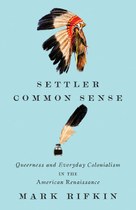Exploring place, politics, and personhood with Mark Rifkin
 In Settler Common Sense: Queerness and Everyday Colonialism in the American Renaissance (University of Minnesota Press, 2014), Mark Rifkin, a professor at the University of North Carolina-Greensboro and incoming president of the Native American and Indigenous Studies Association, explores three of the most canonical authors in the American literary awakening–Hawthorne, Thoreau, and Melville–demonstrating how even as their texts mount queer critiques of the state, they take for granted–even depend upon–conceptions of place, politics and personhood normalized in the settler-state’s engagement with Indigenous peoples.
In Settler Common Sense: Queerness and Everyday Colonialism in the American Renaissance (University of Minnesota Press, 2014), Mark Rifkin, a professor at the University of North Carolina-Greensboro and incoming president of the Native American and Indigenous Studies Association, explores three of the most canonical authors in the American literary awakening–Hawthorne, Thoreau, and Melville–demonstrating how even as their texts mount queer critiques of the state, they take for granted–even depend upon–conceptions of place, politics and personhood normalized in the settler-state’s engagement with Indigenous peoples.
Rifkin’s exegesis is relevant far beyond nineteenth-century literary studies. As “settler colonialism” gains currency in left and academic circles as a descriptor of the present reality in the United States, Canada, Israel and elsewhere, there is a tendency to identify its workings only in the encounter between the colonizers and the colonized, the state and Indigenous peoples.
This is a mistake, Rifkin warns. None of the novels he interrogates deal specifically with Native people. Yet colonialism is not, he writes, a dynamic that inheres only Native bodies. Rather, it’s a persistent “phenomenon that shapes nonnative subjectivities, intimacies, articulations and sensations separate from whether or not something recognizably Indian comes into view.”
Colonialism is thus a common sense.
By: Andrew Epstein
Story Date: 2014-08-21T05:00:00+00:00



